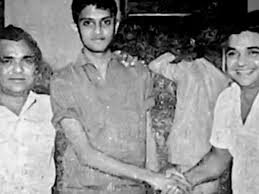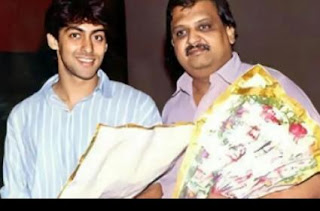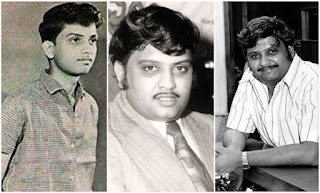PART 2 OF 10: THE EMERGENCE OF A SINGING SUPERSTAR
BALU ARRIVES IN MADRAS
Balu stepped into the galaxy of these talents with very modest dreams. Someone had told me that Shah Rukh Khan (SRK), well before he had started acting in films, had stood at the tip of Queen's Necklace in South Bombay, faced the Marine Drive skyline - his eyes gleaming, his body bent slightly backwards, his hands outstretched - and had exclaimed: "One day, I will rule this city!". Balu did no such thing pointing at the fourteen-storey LIC building in Mount Road, Madras. His aim was to sing "maybe fifteen to twenty songs", earn one hundred and fifty rupees per song and reduce the financial burden on his father, who was money-ordering him a monthly stipend. That is all he had wished for. Within a week of recording his first song for 'Sri Sri Maryada Ramanna', he was called over to record his first Kannada song. Balu did not know the language but went with the flow. He recorded a perky duet, 'Kanasido Nanasido', again with P. Susheela (music by M Ranga Rao, lyrics by Vijaya Narasimha).
Balu was all of twenty years then. His voice was nasal and had a very Ghantasala twang to it. He was, of course, getting better with each song. The “Golti” (as Telugus were called in Madras; the word 'Gulti' that is in more prevalent use now perhaps originated from there) didn't know Tamil or any language other than his mother tongue, except maybe a smattering of Hindi thanks to his fondness for Mohammad Rafi.
He recorded a few more Telugu songs in the next couple of years. In the meantime, he had tried his luck with MS Viswanathan and KV Mahadevan, the biggest names in Tamil film music then, but with no avail. MSV, observing his ragtag Tamil pronunciation, had told him to spruce up his diction if he hoped for a chance to sing for Tamil movies. These were not the nineties, when it was faddish to sing in fashionable accents. AR Rahman, in particular, made a living out of air-dashing an army of singers from up north into Panchathan Studio and gave them a free ticket to molest Kanni Tamil with their torrid accents.
He recorded a few more Telugu songs in the next couple of years. In the meantime, he had tried his luck with MS Viswanathan and KV Mahadevan, the biggest names in Tamil film music then, but with no avail. MSV, observing his ragtag Tamil pronunciation, had told him to spruce up his diction if he hoped for a chance to sing for Tamil movies. These were not the nineties, when it was faddish to sing in fashionable accents. AR Rahman, in particular, made a living out of air-dashing an army of singers from up north into Panchathan Studio and gave them a free ticket to molest Kanni Tamil with their torrid accents.
(I am not being parochial. May the best talent get all the work, no matter where they hail from. But if you want to sing in a language that you don't know, at least make the effort. Don't show up unprepared, like Udit Narayan, and murder a language. It is not that difficult. Every eulogy that I read about SPB, while effusive about his skills, didn't fail to mention his "South Indian accent" when singing in Hindi. But people in the know will vouch for the time and effort that Balu spent with the lyricists and composers to get the diction as right as he could in any language he sang, not just Hindi).
Balu bought a copy of the 'Learn Tamil in 30 Days' by Balaji Publications and started cramming the Tamil alphabet with a vengeance. In less than thirty days, he started singing 'Muthai tharu pathi thirunagai, Athikkirai saththi saravana...'. No, he did not do that. I just made that up. I don’t know how he learned the language but he must have done something miraculous, for when he sang his first Tamil number, there was not a hint of the Nellore Telugu accent. P. Susheela, P.B. Sreenivas, and S. Janaki were all native Telugu speakers and must have been an inspiration. By his own admission, he learned to read and write Tamil from the ubiquitous movie posters of Madras. So, before the honorable High Courts and the Supreme Court of India pass sweeping orders to ban movie posters, Jallikattu, and the like, I ask them to be mindful of the unintended consequences of such orders. Back to the topic, in his time in Madras, the gregarious Balu, expanded his friend circle to beyond Telugu expats, which would greatly enrich not just his vocabulary but also his musicality. More on that later.
Sometime in early 1969, after he was reasonably confident with his Tamil, Balu went back to MS Viswanathan (MSV) asking for a chance again. His voice must have definitely sounded more evolved and wholesome from the time he had first heard him. But then, MSV was so conditioned to TM Sounderrajan (TMS) and PB Srinivas (PBS). How did he open his mind to Balu immediately? It must have been the freshness and the originality of Balu's voice. It had not acquired the honey-laced, love-at-first-hearing texture that it would eventually, in the late seventies and eighties. But it was good enough for the discerning MSV to say 'yes'. MSV gave him a song in a movie named 'Hotel Rambha'. The movie was never released. There is no record of the song but here is Balu singing that live on Doordarshan a couple of decades ago.
But there was another tasteful and more fateful story that was waiting to happen to Balu. This would prove to be his turning point. One day, when he was recording a song for a movie in AVM Studio, Madras, MGR, the then reigning superstar of Tamil movies, was making a movie named 'Adimai Penn' ('Slave Woman'), a big-budget movie that he was to shoot almost entirely in Jaipur. He was resting under a tree during a shoot, when a Telugu song sung by an unknown singer, incidentally for a dubbed movie that he had originally starred in, caught his attention.
He liked Balu’s voice and called him over for a rehearsal at his home – the famed Ramavaram Gardens, where rumor had it that MGR typically summoned his adversaries. My primary school buddy Srini, my window to Madras city then, used to recount fantastic, and often gory tales of the terror MGR unleashed on his rivals in Ramavaram Gardens and all the bodies that were buried in the backyard. In one such incident, Srini had told me, MGR had reportedly summoned Rajnikanth (Thalaivar was a budding star then) who was smitten with MGR’s consort (or “keep”, as the pejorative went), actress Latha, and roughed him up in the backyard of Ramavaram Gardens. Rajnikanth had to apologize to MGR and Latha or he would have absolutely been buried alive, Srini told me, his eyes wide open. I shuddered at the thought of my childhood hero being overpowered by this wrinkled-up guy in a fur cap - I never liked MGR after that. (Post script: Rajnikanth, in true Thalaivar style, married another girl named Latha, as a way to defy MGR’s decree).
As for Balu, everything went well at Ramavaram and there was no burial required on that day. MGR was, in fact, so pleased with his singing that he immediately booked him to sing a song composed by KV Mahadevan – a duet with P. Susheela, the Nightingale of the South.
However, Balu was hit with typhoid, again. We may think “Oh these dreaded 1960s diseases” and shake our heads. The reality is India continues to grapple with typhoid with thousands dying every year due to this dreaded disease. Maybe a topic for another day.
He liked Balu’s voice and called him over for a rehearsal at his home – the famed Ramavaram Gardens, where rumor had it that MGR typically summoned his adversaries. My primary school buddy Srini, my window to Madras city then, used to recount fantastic, and often gory tales of the terror MGR unleashed on his rivals in Ramavaram Gardens and all the bodies that were buried in the backyard. In one such incident, Srini had told me, MGR had reportedly summoned Rajnikanth (Thalaivar was a budding star then) who was smitten with MGR’s consort (or “keep”, as the pejorative went), actress Latha, and roughed him up in the backyard of Ramavaram Gardens. Rajnikanth had to apologize to MGR and Latha or he would have absolutely been buried alive, Srini told me, his eyes wide open. I shuddered at the thought of my childhood hero being overpowered by this wrinkled-up guy in a fur cap - I never liked MGR after that. (Post script: Rajnikanth, in true Thalaivar style, married another girl named Latha, as a way to defy MGR’s decree).
As for Balu, everything went well at Ramavaram and there was no burial required on that day. MGR was, in fact, so pleased with his singing that he immediately booked him to sing a song composed by KV Mahadevan – a duet with P. Susheela, the Nightingale of the South.
However, Balu was hit with typhoid, again. We may think “Oh these dreaded 1960s diseases” and shake our heads. The reality is India continues to grapple with typhoid with thousands dying every year due to this dreaded disease. Maybe a topic for another day.
Balu was bed-ridden for a month and had thought that he had lost his chance. A month later, someone from MGR’s office came to check on him and asked him to report to the recording studio. Perplexed, Balu reached the studio where he was accosted by KV Mahadevan to get ready to sing a song. Balu’s happiness doubled when he found out that the song was the same that he had rehearsed a month ago. What had happened? Weren’t MGR and crew supposed to leave for Jaipur for shooting the movie? Hadn’t they recorded that song with someone else? No, they hadn’t. This is a widely reported incident and I will leave out the details, but MGR had waited for Balu for an entire month, postponing the shoot. And for this, Balu was eternally grateful to MGR and KV Mahadevan. “Gaane gaane pe likha hai gaane wale ka naam” (Every song has the singer's name written on it), Balu philosophized in an interview later. 'Adimai Penn' released on May 1, 1969. The song, 'Ayiram nilave vaa' penned by poet Pulamai Pithan and set to Dharmavathi ragam, was a runaway hit, and the movie was a rousing success. Singing his first song for the biggest hero in Tamil, whose voice for the last twenty years was the legendary TM Sounderrajan, provided a huge fillip to his career. Close on the heels of 'Adimai Penn' came 'Shanti Nilayam'. Balu's youthful flair supported by the changing demographics in the South will make him an unstoppable force in playback singing in the South.
Iyarkai Ennum:
Ee Kadalum (First Malayalam song, Music: Devarajan Master, Lyrics: Vayalar Ramavarma)







Comments
Post a Comment